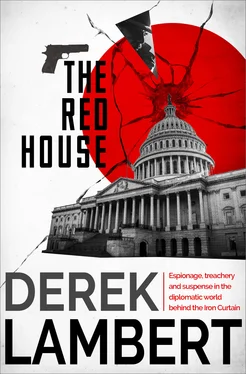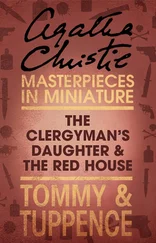THE RED HOUSE
Derek Lambert
COPYRIGHT
Collins Crime Club
An imprint of HarperCollins Publishers Ltd.
1 London Bridge Street
London SE1 9GF
www.harpercollins.co.uk
First published in Great Britain by Michael Joseph Ltd 1972
Copyright © Derek Lambert 1972
Design and illustration by Micaela Alcaino © HarperCollinsPublishers Ltd 2017
Cover photographs © Shutterstock.com
Derek Lambert asserts the moral right to be identified as the author of this work
A catalogue record for this book is available from the British Library
This novel is entirely a work of fiction. The names, characters and incidents portrayed in it are the work of the author’s imagination. Any resemblance to actual persons, living or dead, events or localities is entirely coincidental.
All rights reserved under International and Pan-American Copyright Conventions. By payment of the required fees, you have been granted the non-exclusive, non-transferable right to access and read the text of this ebook on screen. No part of this text may be reproduced, transmitted, down-loaded, decompiled, reverse engineered, or stored in or introduced into any information storage and retrieval system, in any form or by any means, whether electronic or mechanical, now known or hereinafter invented, without the express written permission of HarperCollins ebooks
HarperCollins Publishers has made every reasonable effort to ensure that any picture content and written content in this ebook has been included or removed in accordance with the contractual and technological constraints in operation at the time of publication
Source ISBN: 9780008268343
Ebook Edition © November 2017 ISBN: 9780008268336
Version: 2017-10-04
DEDICATION
to
Blossom with love
MANY good people helped in the preparation of this novel. They know who they are and I thank them. In particular I wish to express my gratitude to Brian and Nelli Hitchen and Gordon Lindsay who provided shelter. To Ross Mark who introduced me to Washington. To Peter Worthington who introduced me to a defector. And to Donald Seaman, my mentor.
AUTHOR’S NOTE
THE period is 1968. A year that embraced the assassinations of a black and a white leader, a space-shot, the election of a new American president, race riots of unprecedented fury, the Russian invasion of Czechoslovakia. A savage, tragic, momentous year. In the interests of the narrative I have jockeyed a few dates, a few occasions, a few moods, and I apologize to any students of contemporary history who may be offended. It should also be noted that some of the speeches in the sequence dealing with an actual meeting of the United Nations Security Council are interpretations published by the U.N. and not precise translations.
CONTENTS
Cover
Title Page
Copyright
Dedication
Author’s Note
Part One
Chapter 1
Chapter 2
Chapter 3
Chapter 4
Chapter 5
Chapter 6
Chapter 7
Part Two
Chapter 8
Chapter 9
Chapter 10
Chapter 11
Chapter 12
Chapter 13
Chapter 14
Chapter 15
Part Three
Chapter 16
Chapter 17
Chapter 18
Chapter 19
Chapter 20
Chapter 21
Keep Reading
About the Author
By the Same Author
About the Publisher
PART ONE
1
SEVEN a.m. on New Year’s Day. Beneath the aircraft the lights of Long Island probed the sea with disciplined jewelled fingers. The lights of Moscow, Vladimir Zhukov thought, had been more abandoned: scattered nebuli of milky neon. Symbolically, the lighting plans of Capitalism and Socialism should have been the other way round.
Zhukov swallowed his vodka as if it were the last drop of Mother Russia’s milk: there had been many vodkas on this special II-62 flight from Moscow to New York.
Beside him his wife closed her handbag with the finality she instilled into most movements. ‘Please excuse me,’ she said, standing up.
‘You are going to prepare yourself to meet the decadent, bourgeois imperialists?’
‘I am more concerned with making myself presentable for the representatives of our embassy.’
‘It was only a joke,’ he told her retreating figure as it stumbled, uncharacteristically, with the descent of the aircraft. He watched her with affection, then moved into her seat.
The affection melted into many emotions. Expectation, curiosity, pride at what he represented. And a vague, uncertain apprehension, as cold and disquieting as a first snowflake smudging the window of a warm and complacent room.
He gazed down at the avenues of lights, the pastures of snow luminous in the darkness, the black oil of the sea extinguishing the lights. Coney Island? Long Beach? The old movies on which most assessment of America was based—forgetting propaganda for the moment—had another revival in the auditorium of his mind. Jack Oakie, Alice Faye, George Raft. Cops with caps and nightsticks, black shoeshine boys, double-breasted suits with lapels as flat as cardboard, leaning tenements and jostling skyscrapers, ice-cream sodas, bourbon on the rocks, girls with lovely legs and afterthought faces, the drawling south and the snapping north, sub-machine guns, King Kong. That’s my America, that’s the America of the most humble apple-picker in Kazakhstan. There it is spangled beneath me. True or false?
And, returning inevitably to the propaganda, he thought: New York—the fount of decadence, the blood-bank of criminal aggression. True or false?
Vladimir Zhukov, aged forty-four, newly-appointed second secretary at the Embassy of the Union of Soviet Socialist Republics in Washington, gripped his empty finger-greased glass tightly and regarded the accelerating reality with awe.
His wife returned smelling faintly of Russian cologne. The smell of our soap, our pomade, our scent. The smell of the audience at the Bolshoi. Turn the serpent head of the aircraft around and fly it back to Moscow. New Year’s celebrations—the children with presents from the toyshop in Kutuzovsky, Kremlin parties with clowns and storytellers, Georgian wine, Stolichnaya vodka, bearhugs, skating in Gorky Park, women singing with lemon-juice in their voices. From his pocket he took a New Year’s card—foreigners in Moscow sent them as Christmas cards—and examined the Kremlin. Two red stars and a flag perched on pencil-sharpened spires and golden baubles. Plus the new Palace of Congress completed in 1961 and seating 6,000, his statistical mind recalled. And somewhere in the centre of this symphony of architecture the big growling bears.
He glanced at his wife in case she was listening to his thoughts. But she was busy fastening her safety belt, pleating the waist of her black suit inside it.
Vladimir Zhukov said, ‘We’re fortunate to be flying direct to New York, instead of Montreal.’
‘We’re very fortunate,’ Valentina Zhukova agreed.
He patted her hand because of adventure shared and she smiled with a glint of gold; the glimpse of sunlight she sometimes regretted.
‘Do you feel nervous?’ he asked.
‘Not at all. You shouldn’t either.’
‘I didn’t say I was,’ he lied.
‘But you aren’t completely happy at the prospect of our arrival.’
He shrugged his big torso. Over-shrugged. Who would ever suspect the fragility inside such a big frame? The poetry drowning in statistics. His stomach rumbled as the vodka passed on, depositing the last of the alcohol into his blood.
Valentina said, ‘You shouldn’t have drunk so much.’
‘It’s the first day of the new year. Back home we’d be celebrating and Natasha would be singing to us in our apartment.’
‘Are you sure you didn’t drink to give yourself courage?’
Читать дальше












